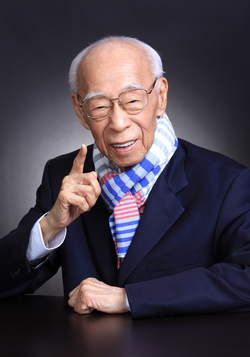Jao Tsung-I


Professor the Honourable Jao Tsung-i, GBM
Doctor of Letters, honoris causa (2012)
Professor Jao Tsung-i, also named Bolian and Xuantang, was born in 1917 in Chaozhou of Guangdong Province. An autodidact, Professor Jao was Professor and Chair Professor at the Wuxi College of Chinese Culture, the Department of Chinese at the Chinese University of Hong Kong, the Department of Chinese at the National University of Singapore, Institute of History and Philology of Academia Sinica in Taiwan, the Department of Chinese at the Chinese University of Hong Kong, Ecole française d’Extrême-Orient, Ecole pratique des hautes études of Paris, and Yale University. He was also Honorary Professor at such prestigious universities as Peking University, Fudan University, Nanjing University, and Zhejiang University.
Born into an erudite family and home schooled since childhood, Professor Jao Tsung-i has already completed The Scholastic Journals of Gu Tinglin at the tender age of 14. Later on, his scholarly pursuits expanded in both breadth and depth, commanding a vast academic repertoire covering classical studies, oracular bone inscriptions, archaeology, epigraphy, bamboo and silk texts, bibliography, regional folklore studies, the study of poetry and ci, historiography, palaeography, religious studies, art history, music and literature. Professor Jao has pursued all these areas with distinction and made ground-breaking discoveries. He once frequented the museums in Paris and London to conduct comprehensive research on Dunhuang Studies, and has laid important foundations for the now global discipline.
Professor Jao’s erudition is by no means limited to traditional Chinese studies. He has once travelled to India to conduct in-depth research on the history of Central Asia by combining historical records and extant documentation. He is also widely knowledgeable in cuneiform philology and in the history of West Asia. He has spent ten years of his life translating into Chinese the epic of the creation myth of the Akkdian, E-nu-ma.E-lis, helping to fill a large gap in Chinese mythological studies and the study of the early history of West Asia in Chinese.
Besides academic pursuits, Professor Jao is recognized for his achievements in creative art. His works of Chinese calligraphy and painting boast a unique character, and his “Jao’s Clerical Script”—a calligraphic style of his own creation—was held in particularly high regard. “The Wisdom Path”, a calligraphic installation created by Professor Jao and which sits at Ngong Ping of Lantau Island, is now an important local landmark. Professor Jao is also a most competent performer of the Qin, an ancient strings instrument of China, as well as a well-known writer of the ancient Chinese literary genres.
Throughout his 80 years of academic career, Professor Jao has published over 100 academic and artistic monographs and nearly 1,000 academic papers. He was a master scholar of encyclopaedic proportions. Renowned and respected both inside the country and overseas, Professor Jao has been awarded numerous academic honours including the Prix Stanislas Julien by Academie des Inscriptions et Belles-lettres, Institute de France—known as the equivalent of the Nobel Prize in Western Sinology. He was also the recipient of the Hong Kong Arts Development Council Honorary Award and was presented the Grand Bauhinia Medal by the Government of the Hong Kong SAR.
Professor Jao attaches high importance to the research of Chinese culture and civilization in Hong Kong and around the world. In his spirit, the Jao Tsung-I Petite Ecole, the Jao Studies Foundation, the Jao Tsung-I Academy has been founded successively in Hong Kong with momentous and far-reaching social impact.
Over the years, Professor Jao has always been attentive about the development of HKBU. In 2011, upon the University’s invitation, he became the honorary adviser to Mr. Simon Suen and Mrs. Mary Suen Sino-Humanitas Institute, and has since given invaluable guidance to the various projects of the Institute.
Professor Jao Tsung-i is a masterly scholar of encyclopaedic erudition. His contributions to Chinese culture and to research in various areas of humanities are unparalleled; his achievements in higher education are widely respected. He has profoundly influenced and will continue to inspire the promotion of Chinese culture in Hong Kong and around the world.